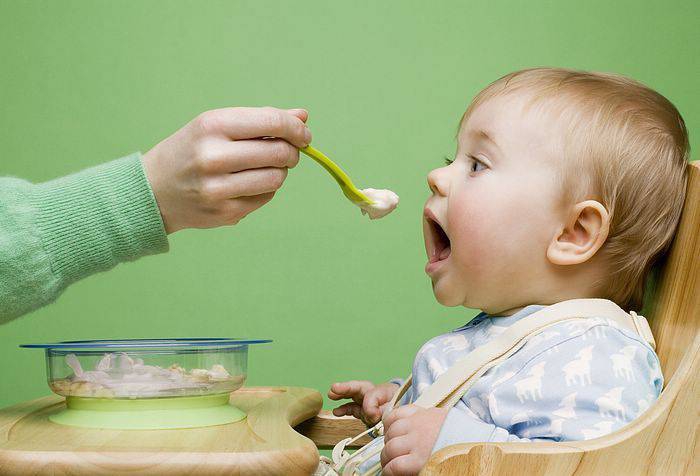Multi-tabs for babies up to one year old have long gained popularity among mothers. Multivitamins promote healthy child development and replenish daily norm necessary substances. Does the drug really give such a positive effect and does not cause side effect? It's very easy to understand.
Multi-tabs for children under one year old
If a mother wants to strengthen her child’s immunity, doctors recommend using combined multivitamins for infants up to one year old. Medicine must be taken orally and only at the calculated rate. These vitamins for children under one year old can be purchased in a 30 ml glass bottle Brown with a pipette. Active substances The drug will contribute to the proper formation of bones, teeth, and vision.
Vitamin A for children
Retinol has a positive effect on the whole immune system, promotes excretion harmful substances. The component is the most important component that is responsible for the infant’s vision and the formation of the infant’s skeleton. Thanks to vitamin A for children, which is included in the complex, the body becomes less susceptible to various infections and diseases.
Vitamin D for children
Colecalciferol is especially necessary for babies in the first years of life. Responsible for the content of calcium and phosphorus in the body, because with their help the formation occurs bone tissue. Vitamin D for children improves absorption useful substances in the gastrointestinal tract, prevents the development of rickets and the appearance of osteomalacia. In addition, it has a positive effect on the baby’s entire immune system.
Vitamin C for children
Ascorbic acid helps strengthen the immune system, helps in treating colds and fighting various viruses. The substance is collagen, which promotes the production of protein, which is so important for the normal formation of bones and teeth. Vitamin C for children is responsible for the absorption of nutrients, removes toxins, and has a positive effect on blood composition.
Multi-tabs Baby - instructions
The multivitamin complex is created in such a way that all the beneficial substances included in the composition complement each other and are quickly absorbed by the body. Oral drops should be used only as directed to avoid overdose. The medicine must be kept in the refrigerator, the shelf life after opening is a maximum of 2 months. In pharmacies the product is sold without a prescription. The instructions for Multi-Tabs Baby state that the drug is not recommended to be combined with other multivitamin complexes.

It should be used with caution by those who have individual intolerance to some components of the drops. The main contraindications for the use of Multi-Tabs up to one year include those cases if the baby has hypercalcemia, allergic reactions for some substances. It is worth considering that the drug can also have a laxative effect.
Multi-tabs Baby - composition
Unlike classic version, such a complex has a different composition, which is aimed at young children. When taken correctly, the product improves general state crumbs, accelerates the metabolic process, improves immunity. It will help replenish the deficiency of minerals and essential substances in the baby’s body. Multi-tabs Baby includes the following components:
- Vitamin A. Forms the basis. Its content per 1 ml is 300 mcg.
- Vitamin D – 10 mcg and C – 35 mg.
- Sucrose. It breaks down into glucose, ensures proper functioning of the liver, and facilitates the process of intoxication of the body.
- Macrogol glyceryl hydroxystearate. Improves absorption, prevents gastrointestinal problems.
In addition to the above components, Multi-tabs Baby will contain a small amount of sodium bicarbonate, ethanol 96%, citric acid, water. Also among the inactive components are alpha-tocopherol and triglycerides. Thanks to the interaction of all components of the complex, the product is effective and safe for the health of babies up to one year old.

Multi-tabs Baby – dosage
You can give drops to babies from birth to one year. It should be taken orally after or before meals. Using the convenient pipette included in the kit, the dosage of Multi-Tabs Baby up to a year will be measured correctly. The recommended dosage of medication per day is 0.5–1 ml. The colorless vitamin liquid should be given in seasonal courses to achieve maximum results.
Price for Multi-tabs Baby
You can buy high-quality original multivitamins in pharmacies and kiosks. The cost of the drug may vary depending on the city. In Moscow, a vitamin complex for children under one year old may cost a little more than in other cities. The cheapest way is to order the drug online and pick it up from the nearest pharmacy. The price of the drug fluctuates within such limits.
Vitamins for children under one year of age are the foundation on which the baby’s future health is built:
- proper development of organs;
- strong immunity;
- mental capacity;
- puberty;
- normal skeletal and muscle growth.
But this does not mean that a toddler who has not yet grown out of diapers needs to be stuffed with pharmacy vitamins. Ideally, the baby should receive the substances necessary for growth and development with mother's milk, and from 6 months - along with complementary foods.
Has your baby been switched to artificial feeding? Do not rush to the pharmacy if he drinks about 500 ml of ready-made milk formula per day and there are no signs of vitamin deficiency. Manufacturers of ready-made baby food add to their products all the nutrients necessary for a child up to one year of age.
Why are vitamins needed?
With a lack of one or another vitamin, a child develops various abnormalities.
- A. Deficiency leads to slow growth, disease skin and mucous membranes, night blindness develops (weak vision in the dark). Sources: eggs, milk, yellow vegetables and orange color, such as sweet potatoes, carrots and zucchini.
- D. Deficiency causes rickets in children. Excess provokes headache and drowsiness. : dairy products, fish fat, pharmacy supplements. Sunlight is also needed.
- E. Lack of this compound leads to various developmental disorders, weakness, and muscles atrophy.
- C. Participates in the process of saturating bone tissue with calcium, iron absorption and collagen synthesis. Deficiency causes scurvy. Sources: Tomatoes, kiwis and strawberries, citrus fruits, and green vegetables such as broccoli.
- B1. Required by the body for the normal development of the nervous system and carbohydrate metabolism.
- B2. If there is a deficiency, the child’s growth rate slows down, foci of inflammation appear on the lips and in oral cavity, seborrhea, skin elasticity is lost.
- B3 (PP). With its deficiency, the condition of the skin worsens and the activity of the gastrointestinal tract is disrupted.
- AT 5. A deficiency provokes sleep disturbances, increases nervous excitability, causes digestive problems, and inhibits growth processes.
- B6. The lack of this substance leads to disruption of protein metabolism, decreased production of lymphocytes, and increases the likelihood of developing abnormalities in the activity of the nervous system.
- B9. Deficiency leads to anemia, hair loss, the formation of necrotic lesions in the muscles, and slow development and growth.
The best sources of B vitamins for a baby over 6 months of age are: meat, including chicken, fish, eggs and milk. It’s too early to talk about nuts and cheese.
Selection of vitamins for the little ones
Given modern environmental realities and the constant employment of parents, children often suffer from vitamin deficiencies. In what cases is it necessary to take vitamin supplements for up to a year? Pediatricians attribute pharmaceutical supplements to:
- children who eat irregularly or have limited food intake, for example due to lactose intolerance;
- picky eating toddlers who don’t eat well;
- kids with chronic diseases such as asthma, digestive disorders, especially those taking medications for medical reasons;
- children with symptoms of vitamin deficiency;
- frequently ill infants.
The modern pharmaceutical industry offers three main categories of such drugs:
- monovitamins;
- multivitamins;
- vitamin and mineral.
The assortment is so large that sometimes when purchasing it is difficult to understand which of the drugs is really needed.
Consider the following factors:
- pediatrician’s recommendations on vitamins needed in the child’s diet;
- baby's age;
- release form (lozenges, pills, suspension);
- brand reputation;
- place of sale: exclude unfamiliar pharmacies.
A child up to one year of age can only be given liquid vitamins. Chewable lozenges and pills – big risk. You don't want your baby to choke.
What should you pay attention to?
Signs of a lack of vitamins in a child’s diet:
- the baby is lethargic, constantly capricious, moves little;
- are becoming more frequent colds, and the recovery process is delayed;
- The baby's skin becomes dry, small pimples appear on it, nails peel, and hair grows poorly.
Doctors divide vitamin deficiency into three main forms:
- vitamin deficiency (severe),
- hypovitaminosis (moderate),
- subnormal security (mild).
The most common vitamin deficiency in children is mild form, but this is not a reason to let the situation take its course and not take any measures. Seek help from a doctor and act solely according to his instructions.
Be careful when introducing vitamin preparations into the diet of children under one year of age. Monitor your body's reaction. If any side effects: allergic reactions, diarrhea, nausea, vomiting, then use should be stopped immediately.
Every parent wants to see their child happy and healthy. In our modern conditions this is not so simple, since negative factors (poor environment, low food value) only interfere with the normal development of the baby. Therefore, it is very important to choose the right vitamins for a child under one year of age and older, which could provide the little body with all the essentials as much as possible.
When do you need vitamins?
Food products in their natural form are the main source of vitamins. At balanced diet Vitamin deficiency and hypovitaminosis can be avoided if desired. But the disadvantage nutrients occurs very often, and especially in winter and spring.
By March, all vegetables and fruits contain practically no nutrients. And even by including a wide variety of fresh salads, vegetables and fruits, as well as freshly squeezed juices, it still won’t be possible to fully support a child’s body. Therefore, it is recommended to replenish them artificially with the help of fortified complexes.
Before choosing vitamins for your baby, you should definitely consult your doctor. Only he will be able to determine the child’s actual need for vitamins and prescribe the right drug. Even if the baby developed normally in the mother’s womb and this moment completely healthy, the need for taking vitamins is influenced primarily by nutrition.
If the child is feeding breast milk, is in the sun, walks for a sufficient amount of time and his mother eats well, then until the age of 6 months he will not need any vitamin supplements.
It is better to add them to the mother’s diet so that they enter the baby’s body through breast milk. After six months, the baby’s need for vitamins begins to increase. Then it’s worth consulting with a doctor who will recommend the most optimal complex of vitamins. The mother's diet, complementary feeding, season, region, environmental situation and hereditary factors are also important.
If the child receives artificial feeding, it is recommended to introduce vitamin complexes from the 4th week of the baby’s life. The amount of vitamins will be more than prescribed during breastfeeding.
Why do babies need vitamins?

Vitamins are taken for the following purposes:
- to improve the immunity of frequently ill children, especially in the winter and spring;
- for the prevention of childhood rickets.
When a baby gets rickets, he sleeps and eats poorly, becomes irritable, sweats excessively, and the hair on the back of his head begins to fall out. Gradually, irreversible changes in the bones and curvature of the skeleton may occur, and the baby will lag behind his peers physically and intellectually. It's all about vitamin D, which children's bodies lack. And in order to prevent the development of the disease, the child must receive sufficient quantities of this vitamin. It is known that somewhere before the age of three the need of the growing child's body it is much higher than that of an adult.
The main source of vitamin D is the sun's rays that hit the skin. Therefore, it is very important to walk the child in the sun during those periods when there is very little of it - late autumn, winter and in early spring. From September to the end of April, vitamin D is recommended to be given to children at separate form or in combination with other vitamins.
The likelihood of rickets increases significantly when it comes to twins or premature babies. They do not receive additional nutrition during pregnancy, so the amount of necessary vitamins should be replenished through additional consumption.
Vitamins are very important and needed for normal growth small organism. Retinol acetate or vitamin A normalizes the growth of cells in a child’s growing and developing body and is responsible for the formation visual function. Colecalciferol or vitamin D is needed for the normal growth of the baby’s bones and teeth and for the prevention of rickets. A ascorbic acid(vitamin C) has antioxidant properties, promotes hematopoiesis and tissue formation, strengthens the immune system, normalizes metabolism and prevents the development of anemia.
How to take vitamins?

The form of release of vitamins for children under 1 year is most suitable for childhood- These are drops, gels and powders. When choosing a vitamin complex, you should buy one that is easier to give to your child. In particular difficult cases If there is a lack of vitamins in the child’s body, they are prescribed as intramuscular injections. Only a specialist should prescribe and carry out such procedures.
When choosing vitamins for your baby, you should definitely pay attention to additional substances in the vitamins. Flavorings and dyes should especially attract attention.
Even in completely healthy children they can cause allergic reactions. Therefore, after taking vitamins, it is necessary to monitor the child and, if even minor signs of allergy appear (itching, flaking, dry skin, poor appetite), the drug should be discontinued and consult a pediatrician.
The first half of the day is the most optimal time to take vitamins. Doses should be given only those indicated in the instructions for use or prescribed by the pediatrician. Vitamins are usually given once a day, which is convenient for their use, during or after meals.
The most popular vitamin preparations for infants:
- monovitamin Aquadetrim (vitamin D only);
- vitamin complex Multi-tabs-Baby (A, D, E).
The release form of the Multi-tabs-Baby complex is drip. The bottle has a pipette with a dispenser, which is convenient for precise definition amount of drug used. Multi-Tabs-Baby is given to a child with food or immediately after eating it. This complex contains no preservatives, dyes, or fragrances, which significantly reduces the likelihood of developing allergies in infants.
The choice of drug is determined by several factors. Single-component vitamin preparations are prescribed with therapeutic purpose with an obvious shortage. Infants are usually prescribed vitamin D3; all other vitamins will be obtained from mother's milk or formula. After an illness, you can give your child restoratives with vitamin C and iron. And in the event of an environmentally unfavorable situation in the region, the baby may need additional magnesium and iodine.
A child who was born on time and without deviations and is breastfed or artificial feeding, no additional vitamins are required for newborns. With a balanced diet from the mother, he receives all the necessary substances along with breast milk, and in the absence of it, they come to him from dry formulas.
However, in last years Doctors often prescribe vitamins to newborns from the first days of their life. In particular, for the prevention of rickets. Being serious illness with serious consequences, it is quite easy to prevent by timely receipt of vitamin D, necessary for the absorption of calcium. However, at the same time, an excess of this vitamin has no less sad consequences, and only a doctor can determine its need for a newborn after thorough examinations.
It cannot be denied that in a natural way - through food and a healthy daily routine with regular walks on fresh air And good sleep– it is not always possible to ensure the supply of necessary substances. And then vitamins in the form of drugs come to the rescue. To guarantee health and ensure normal development, a child from the first days of life should receive a complex of vitamins and minerals. In addition to the normal development of all organs and tissues, they improve health and protect the body from various infections (prevention).
What you need to know about vitamins for newborns
Vitamins can be single-component, they are taken in case of obvious deficiency of a particular substance. Moreover, this deficiency may be associated both with the health characteristics of the baby himself and with the content of vitamins and minerals in the area of residence. There are single-component preparations of vitamins A, D, E and C, as well as compositions containing iodine, magnesium, etc. (the latter are not vitamins - they are microelements, also very necessary for a developing organism).
Multicomponent mixtures are called multivitamins: in addition to several vitamins themselves, they often also contain minerals. In some vitamin complexes There are also micro- and macroelements, various enzymes and extracts of medicinal plants.
All these drugs are vitamins of artificial origin. However, there are also natural preparations. These include products from various microalgae, which are easily digestible and quickly exert their effect.
In addition, vitamins are supported by eubiotics, which contain complete intestinal microflora, which helps with the absorption of food in general and vitamins in particular, as well as protecting the child’s body from dysbiosis.
The most popular vitamins for newborns
There are many types of vitamins for newborns on the market today. They differ in the composition and dosage of certain beneficial substances, the presence or absence of additional medicinal extracts, as well as flavors and dyes.
One of the most well-known multivitamins for newborns, especially those with a special mark “from 0 to 1 year,” is Multitabs-baby. This complex contains vitamins A, D and C in optimal proportions for babies. It ensures normal cell growth and promotes the formation of immune and skeletal systems, is the prevention of rickets. The bottle-shaped release with a dispensing pipette is very convenient to use.
Of the monovitamins, the most common are Aquadetrim and ergocalciferol oil solution, both contain vitamin D. Depending on the indications and condition of the child, a prophylactic or therapeutic dose may be prescribed. Vitamin D provides protection against rickets (lack of calcium absorption), its intake has a positive effect on the condition of human bones, teeth and hair.
If necessary, the pediatrician prescribes a reduced dose of drugs intended for children over 1 year of age: Pikovit, Sana-Sol, Vidaylin-M, etc.
A means to maintain healthy body newborn children are vitamins. It is recommended to give your child vitamins that are intended for their specific age. Children under 5 years of age should be given multivitamins that contain vitamin D. For children who are bottle-fed, the dose of vitamin D is calculated based on the mixture.
What vitamins are required for newborns?
Vitamin D is necessary for the formation healthy bones. If a child does not receive enough vitamin D, there is a risk of rickets. Rickets is a disease that causes bones to soften, reducing bone density and disrupting skeletal structure. If your child's appetite or weight decreases, we recommend that you consult a doctor.
Vitamin D is necessary for newborns to develop bones and teeth. Vitamin D regulates calcium and phosphorus metabolism and protects bones from rickets. No one infant does not get the required amount of Vitamin D from food. Vitamin D is necessary for the formation of healthy bones. If a child does not receive enough vitamin D, there is a risk of rickets. Rickets is a disease that causes bones to soften, reducing bone density and disrupting skeletal structure. If your child's appetite or weight decreases, we recommend that you consult a doctor.
The benefits of vitamin A for newborns
For a newborn essential vitamin is considered vitamin A. Vitamin A is very important for the normal function of vision and sensory organs. To saturate the body with the necessary amount of vitamin A, we recommend eating a lot of fresh herbs, especially parsley and dill. There is also a lot of Vitamin A in carrots, pumpkin, liver, spinach, fatty fish, cottage cheese, sour cream.
The benefits of B vitamins for newborns
Vitamins for newborns of group B, promote work nervous system, blood flow, organ growth. A lack of B vitamins has a negative effect on the child’s body. In this case, growth slows down, and this also affects the skin, heart, stomach, and nervous system. B vitamins are found together in every single product. There are many vitamins of this group in yeast, milk, greens, and fruits.
The benefits of vitamin C for newborns
Vitamin C is necessary for the development of skeleton, bones, blood vessels, red blood cells. Vitamin C strengthens immunity to infections and neutralizes toxins. At acute failure Vitamin C in the child’s body, we recommend including fresh herbs, mushrooms, sweet peppers in the diet, black currant, spinach, sorrel, citrus fruits, strawberries, cabbage, rose hips.
When a child is born, like his mother, there is a need for vitamins. When eating food, you need to look to see if it causes an allergy in the newborn baby. Healthy honey, chicken eggs, nuts, but they are strong allergens. Also strong allergens are coffee, chocolate, cocoa, strawberries and exotic foods.


